About Adam Smith
Adam Smith, Philosopher and Economist
Adam Smith was born into a modest family in Kirkcaldy, Scotland in 1723. He attended Glasgow University, where he studied under Francis Hutcheson, then went to Oxford on a fellowship designed for students intending ordination into the Episcopal Church. Smith hated Oxford, however, and, at least by the time he left, had no interest in the clergy. In 1746 he returned to Scotland, where he was invited to give a series of lectures, in 1748, on language and literature. He moved to Glasgow in 1751, at first to take up a Chair in Logic. A year later, however, he was elected to his teacher Hutcheson's chair in moral philosophy. From the lectures he gave in this position came his first book, the Theory of Moral Sentiments, and the early versions of many of the ideas that went into his masterpiece of political economy, the Inquiry into the Nature and Causes of the Wealth of Nations.
New Books on Adam Smith
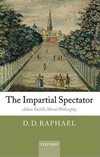 The Impartial Spectator: Adam Smith's Moral Philosophy
The Impartial Spectator: Adam Smith's Moral Philosophy
by D. D. Raphael
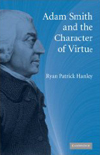 Adam Smith and the Character of Virtue
Adam Smith and the Character of Virtue
by Ryan Patrick Hanley
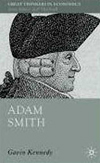 Adam Smith
Adam Smith
by Gavin Kennedy
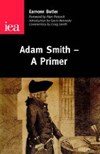 Adam Smith - A Primer
Adam Smith - A Primer
by Eamonn Butler
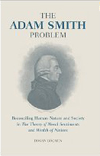 The Adam Smith Problem: Reconciling Human Nature and Society in 'The Theory of Moral Sentiments' and 'Wealth of Nations'
The Adam Smith Problem: Reconciling Human Nature and Society in 'The Theory of Moral Sentiments' and 'Wealth of Nations'
by Dogan Gocmen
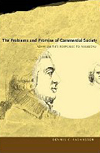 The Problems and Promise of Commercial Society: Adam Smith's Response to Rousseau
The Problems and Promise of Commercial Society: Adam Smith's Response to Rousseau
by Dennis Carl Rasmussen
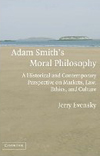 Adam Smith's Moral Philosophy: A Historical and Contemporary Perspective on Markets, Law, Ethics, and Culture
Adam Smith's Moral Philosophy: A Historical and Contemporary Perspective on Markets, Law, Ethics, and Culture
by Jerry Evensky
In 1764, he left his position in Glasgow to serve as a tutor to the young Duke of Buccleugh, a stepson of Charles Townshend, then President of the Board of Trade. In this capacity, he traveled to France and Switzerland, where he met Voltaire, and many of the economic thinkers who have come to be known as the Physiocrats. Smith returned to Britain upon the death of one of his pupils, spending almost a decade, quietly at home in Scotland, in the preparation and writing of Wealth of Nations. Throughout his life, he participated actively in Scotland's lively intellectual circles. A close friend of David Hume, he was also well acquainted with most of the other major figures in the Scottish Enlightenment, including James Boswell, the chemist Joseph Priestley, the historian William Robertson, and the social and political thinkers Adam Ferguson and John Millar.
After publishing Wealth of Nations in 1776, Smith took up a position as Commissioner of Customs — somewhat surprisingly, given his famous opposition to tariffs — which he retained, apparently enjoying his work, until his death in 1790. He wrote to La Rochefoucauld in his later years that he still had "two ... great works upon the anvil" — a system of jurisprudence and "a sort of philosophical history" of the arts and sciences — but he did not publish another book in his lifetime, and he asked that most of his unpublished notes be burned upon his death. These instructions apparently did not apply to several early writings on literature and the history and philosophy of science, which were published in a small volume after his death, simply called Essays on Philosophical Subjects. In the nineteenth century and twentieth centuries, student notes on both his lectures on jurisprudence and his lectures on belles-lettres were discovered and published as well: these have informed much scholarship on Smith, in the past 30 years or so, placing his views on political economy in the richer context in which he seems first to have conceived them.
Two old, but lively and still useful biographies of Smith are:
- John Rae, Life of Adam Smith, (London: Macmillan, 1895) and
- Frances Hirst, Adam Smith, (London: Macmillan, 1904).
The classic, comprehensive modern biography is by Ian Ross: The Life of Adam Smith, (Oxford: Clarendon Press, 1995).
A short survey of Smith’s work from a philosophical perspective can be found in the Blackwell Companion to Modern Philosophy, edited by Stephen Nadler.
Economically and philosophically oriented short biographies of Smith can be found at:
